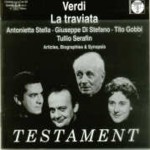This mostly ordinary Traviata, studio-recorded in 1955, is exceptional only for the Alfredo of Giuseppe di Stefano. He was, of course, at the peak of his powers at the time, and while he occasionally oversings (as he always did), his attention to the text and to Verdi’s dynamic markings are lovely to behold. His mastery of phrasing is almost always in evidence–his tenderness in the first-act duet with Violetta is unique among tenors, and you might say the same about “Parigi o cara”. Similarly, his denunciation of Violetta is passionate and filled with both rage and pain.
Violetta is the always tolerable, never spectacular Antonietta Stella. The sheer quality of the voice is good enough but she’s unimaginative and her voice lacks color. Furthermore, the coloratura needed for the end of Act 1 is tentative, and just where spontaneity is called for she sounds planned and fearful. Tito Gobbi somehow seems miscast as Germont, though his singing is always meaningful and elegant, if vocally dry. Some of the comprimarios are simply awful.
Maestro Serafin is at his best in the orchestral preludes–the first one is gorgeous and makes promises that are never delivered–and when Stella is not singing. The recording is a bit hard-edged and boxy. I can think of a dozen better performances of this opera, beginning with any starring Callas or Sutherland.
































